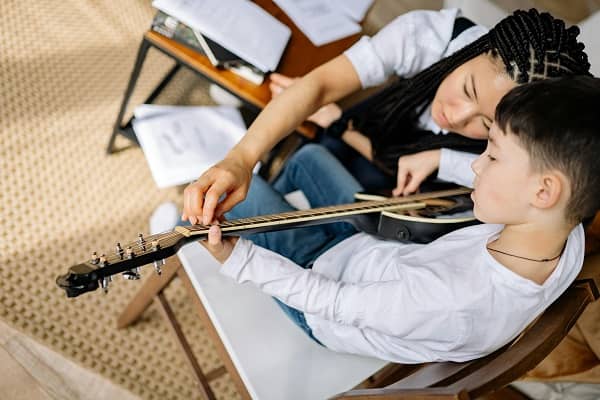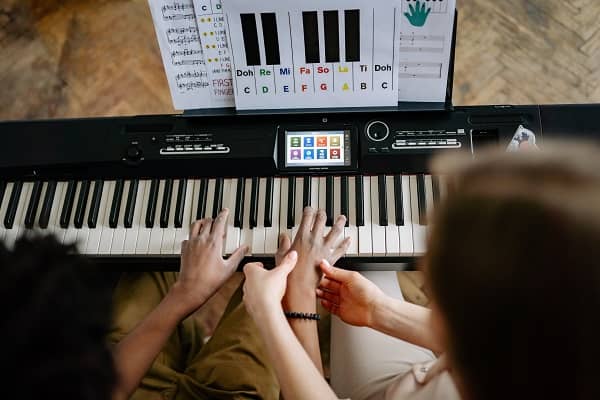Music has the power to enrich lives by sparking creativity, self-expression, and community. As a music teacher, you have the profound opportunity to plant the seeds that could grow into a lifelong passion for the art.
However, effectively nurturing musical ability in young minds is far from simple. It requires a nuanced blend of musical proficiency, pedagogical technique, patience, and administrative savvy.
This comprehensive guide outlines the exact training and credentials needed to qualify for music instruction positions. It also provides actionable advice for structuring engaging lessons, assessing student abilities, planning performances, and connecting with young musicians.
Read on to learn the secrets of exceptional music teachers, because this article illuminates the precise steps you must take to establish a rewarding career sharing your artistic gifts.
Getting the Right Music Teacher Credentials
Naturally, you can’t teach music without some musical knowledge under your belt. While many music teachers have innate musical abilities, you’ll still need to complete specialized schooling to work in schools or professional studios.
Earning Your Music Education Bachelor’s Degree
Obtaining a bachelor’s degree in music education is the most reliable route to certification as a music teacher. Strong instruction in performance, history, and theory of music is offered in this four-year program.
You’ll also take courses in conducting, ensemble participation, and teaching fundamentals. In fact, many music education programs require an audition just to apply!
Be prepared to showcase your musical talents on your primary instrument or voice. Maintaining a high GPA also demonstrates your academic abilities for this competitive major.
Getting Real Classroom Experience
In addition to music-focused coursework, reputable music education programs provide classroom training through observation hours and student teaching.
Here, you’ll get to watch experienced teachers in action and slowly take on your instructional responsibilities under supervision. This hands-on experience allows you to apply the teaching techniques you’ve studied and receive constructive feedback.
By graduation, you’ll feel qualified and excited to have your own classroom!
Earning Your Teaching Certificate
Each state has unique certification standards that music teachers must meet before working in public schools. This often entails passing competency exams and paying licensing fees.
While cumbersome, proper certification ensures you have the skills and knowledge to provide quality music instruction.
Many teachers pursue advanced certifications or master’s degrees as they advance in their careers. Continuing education guarantees you stay up-to-date on the latest methods for engaging young musicians.
Key Responsibilities of a Thriving Music Educator

Once you’ve earned the right to teach, it’s time to build your skills as an effective music instructor. While daily tasks vary significantly based on the teaching environment, below are some of the core responsibilities of most thriving music educators:
Providing Engaging Music Lessons
Naturally, your primary role as a teacher is to conduct engaging music lessons and assist students in developing core musical abilities!
This includes teaching them to play instruments, read sheet music, understand music theory, appreciate diverse musical genres, and use their singing voices.
You’ll need endless patience and top-notch communication skills to convey complicated concepts to struggling musicians. Breaking down difficult passages into small, comprehensible chunks is key.
Assessing Student Abilities
Like any teacher, you’ll need to monitor student progress and provide appropriate feedback to promote growth. This means administering playing tests, tracking advancement through the method books, recording skill levels, and offering praise and constructive criticism.
Conducting periodic conferences with parents and administrators provides insight into how students are progressing outside your four walls.
Directing Musical Performances
What good is learning music if you never perform? Organizing recitals, concerts, and musical theater productions allows students to showcase their developing abilities. As director, you’ll lead rehearsals, coordinate logistics, and ensure everyone remembers their parts!
Performances also build student confidence, accountability, and teamwork skills—all while raising funding through ticket sales. Talk about a win-win!
Managing Administrative Tasks
While not the most glamorous duty, administrative tasks are essential for running an efficient music program. You’ll create budgets for supplies and activities, communicate with colleagues about schedules, and advertise program offerings to prospective families.
Organization and forethought are vital to handling paperwork alongside your other responsibilities. Consider taking business electives to augment these managerial abilities.
Finding Your Niche as a Music Educator
One of the best parts of being a teacher is that no two days look the same. As a music educator, you have options to mold your career around personal strengths and interests. Explore some typical work settings for aspiring music teachers below:
Elementary School Programs
For patient teachers interested in shaping young minds, elementary music programs allow you to introduce basic musical concepts like steady rhythm and pitch matching to students just beginning their educational journey.
The curriculum focuses more on exposure and appreciation rather than technical skills at this level.
Middle School Ensembles
Many band, orchestra, and choir programs kick off in middle school, allowing students to gain proficiency in specific instruments and read intermediate sheet music arrangements.
At this age, they start understanding more complex harmonies and performance techniques—all while navigating adolescence!
High School Marching Bands
For teachers who love pageantry and school spirit, high school music programs offer advanced challenges, like arranging pep band sets and teaching formations for the marching band.
With ambitious teenagers, the sky’s the limit for creative arrangements and energetic half-time shows!
College Music Courses
If shaping future musicians is your passion, teaching at the university level allows you to offer specialized instruction to collegiate students seeking deeper engagement with music. You may teach music theory, lead small ensemble groups, or provide one-on-one music lessons.
Private Music Studios
For ultimate flexibility in your teaching career, consider launching your private studio! Here you can set your own schedule, curriculum, and policies without the red tape of larger institutions.
However, promoting your services, billing students, and providing materials do involve more administrative work.
Secrets from Successful Music Teachers

Becoming an exceptional music teacher requires proper education as well as embodying key traits that set the greats apart. So, how to become a successful music teacher? What are some fundamental music teacher qualities and strengths that allow instructors to thrive?
Let’s unpack some key traits of highly effective and beloved music instructors:
Consistency and Commitment
Students depending on growth need teachers who reliably nurture their abilities through regular lessons. Canceling or tardiness fosters frustration, while dependability conveys care. Protect your calendar to give eager students your full attention each week.
Clear Communication and Connection
Superior teachers relate to students at their level while still challenging them. Getting to know your musicians’ interests and personalities allows you to motivate them intrinsically rather than through intimidation. Provide ample praise mixed with constructive suggestions to build confidence.
Adaptability and Creativity
Great teachers continuously try new approaches to reach struggling musicians using technology, multimedia, composition—anything to make the concepts click! Design fun theme weeks, composition challenges, or movie sing-alongs to keep things engaging.
Understanding Students’ Needs
Gifted teachers assess ability levels and tailor instruction appropriately. For example, simplify rhythms or slow the tempo with beginning violinists. Patience is paramount!
Strong Business Skills
Between billing families, marketing services, tracking inventory, and scheduling lessons, teaching music requires as much business savvy as musical ability—especially for private studio owners. Consider taking business or marketing electives to complement your music credentials.
Additional Vital Qualities
Passion for Music: The best teachers authentically enjoy and wish to share their enthusiasm for music. This passion is infectious and inspires students.
Positive Attitude: Exuding encouragement, patience, and support tend to yield greater results than criticism. Focus on strengthening strengths.
Making Learning Fun: Incorporate games, variety, humor, and incentives to make lessons enjoyable. Students engaged and having fun are motivated to practice more.
Creative Explanations: Great teachers explain concepts in multiple ways, like visually, verbally, or through movement. Different methods click more intuitively for different learners.
Preparedness: Plan well-structured lessons matching students’ capabilities and needs. Prepared teachers exemplify reliability.
There are so many qualities and strengths that allow music teachers to be impactful mentors. Overall, the best instructors balance educational fundamentals with creative and adaptive techniques while connecting with students.
With proper training, consistency, business acumen and the drive to help young musicians grow, you can build a rewarding teaching career.
What is the Career Outlook for Aspiring Music Educators?
If sharing your musical gifts with students sounds appealing, there is a growing demand for qualified music teachers.
According to zippia.com, the job market for music educators in the United States is projected to grow 4% between 2018 and 2028. However, growth varies by region and field of music education.
While some reports suggest the supply of available music teachers is declining with more musicians pursuing nontraditional careers, the data is inconclusive. Qualified candidates willing to earn proper credentialing should find open doors.
In addition, extensive research confirms music and arts curriculum greatly enhances childhood development and academic achievement. Music education improves cognitive abilities, math skills, reading, English language arts, and more.
While budget constraints force some school districts to make difficult decisions, most still strive to prioritize creative programming for its proven value. So, sharing your musical talents can be incredibly rewarding while filling a vital educational need.
Music Teacher Salaries
Of course, you likely chose this career path more for passion than profit. However, the average salary for professional music teachers is around $52,000 annually. Those with advanced certifications, degrees, and years of experience often breach the $80,000 mark!
While not getting rich, earning a living and sharing your artistic talents certainly beats more mundane desk jobs. Private studio owners also have the potential to exceed these benchmarks by growing client rosters and setting custom lesson pricing.
Let’s Sum It All Up!
And with that, you should have all the tools and knowledge needed to pursue this harmonious career path! Teaching music allows you to ignite creative passions in the next generation while getting paid to share your artistic talents.
First, be sure you have musical proficiency and teaching credentials before applying for open positions. Expect to earn specialized degrees alongside classroom training to qualify for certification.
Once in the classroom, emphasize consistency, adaptability, and strong relationships in your teaching practice. Structure engaging lessons catered to students’ needs and abilities. Stay organized with administrative tasks while still making music fun through performances and creative activities.
Lastly, know that parents and administrators recognize music education as pivotal in developing well-rounded, successful students. With job growth on the horizon and competitive salaries, you can make a comfortable living—and an impact—as a professional music teacher.
About the Author
Team Guitar Top Review Talk about Guitars! We are a group of friends that bonded over their shared love of playing guitar. We all have different backgrounds and experiences with music, but we share a passion for writing about the things that we love.


